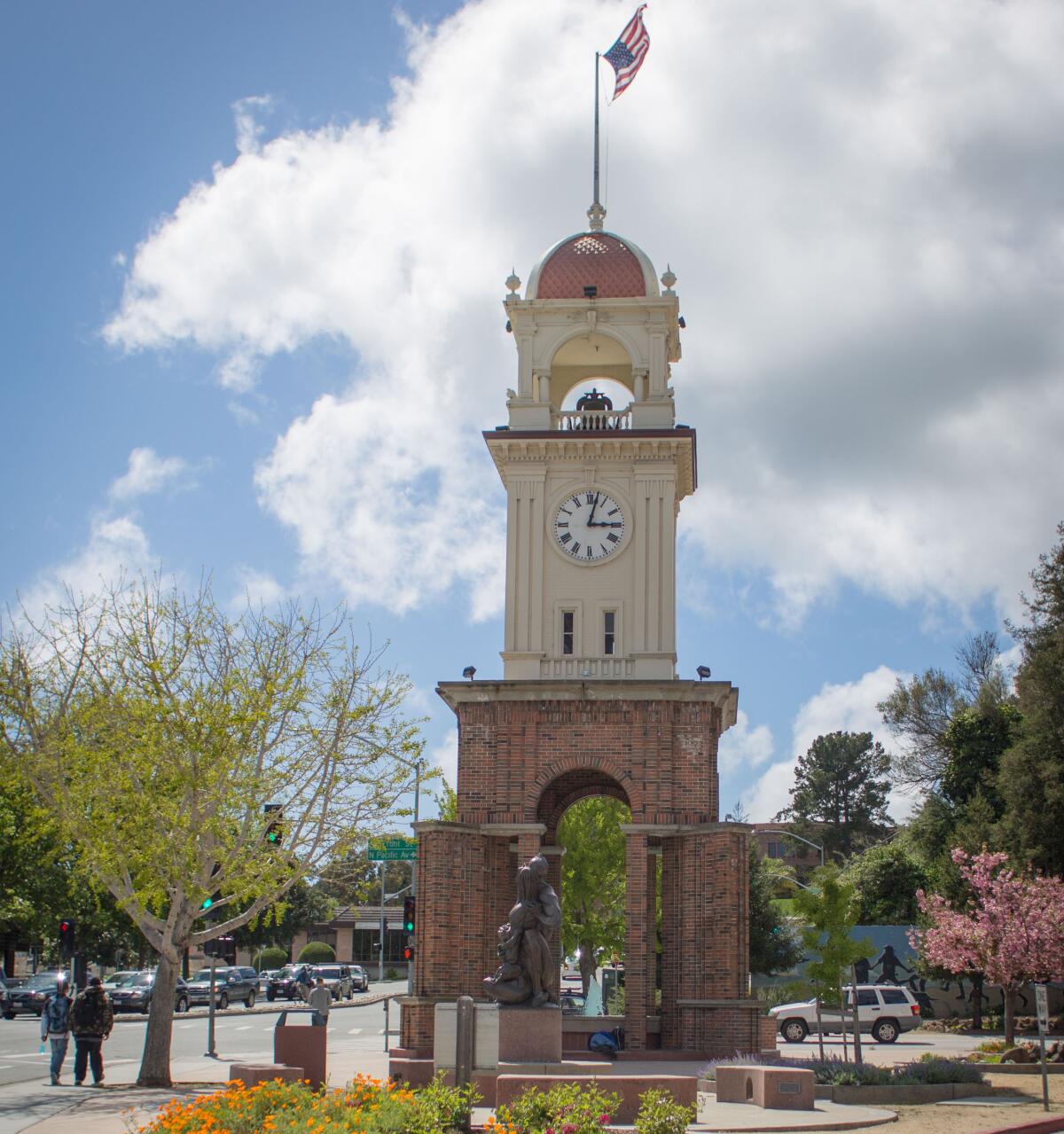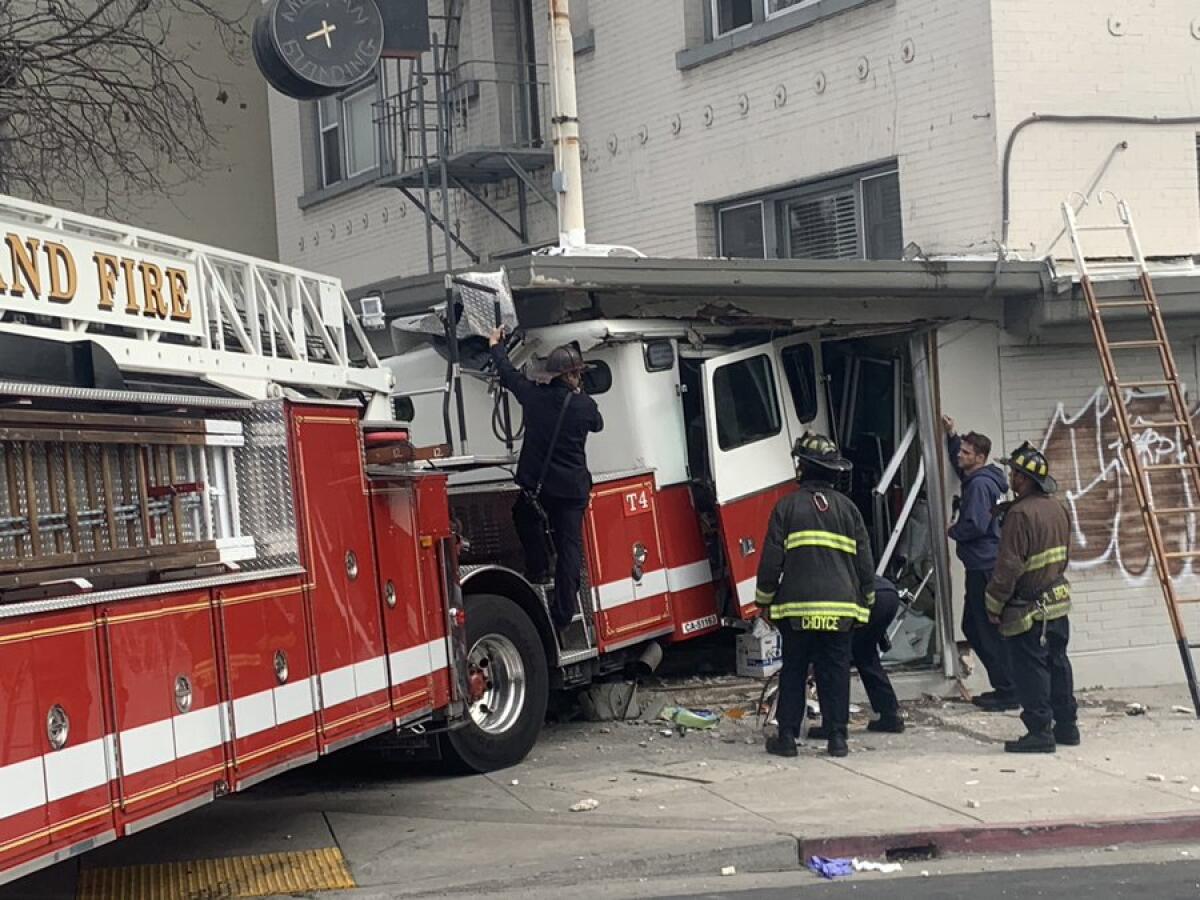Food Not Bombs clashes with the city of Santa Cruz over permits

Good morning, and welcome to the Essential California newsletter. It’s Tuesday, March 1. I’m Justin Ray.
An organization that provides food for individuals experiencing homelessness received a cease and desist order from the city of Santa Cruz.
The organization, called Food Not Bombs, is a collective that provides food to unhoused people across the world. They recover vegan and vegetarian food that would have otherwise gone to the trash, “in protest to war, poverty, and destruction of the environment.”
One precept of Food Not Bombs is that governments and private businesses have become morally corrupt, leading to millions of people going hungry globally. At first glance, you might think Santa Cruz is proving that point with its handling of the organization’s local chapter. But the situation is more complicated than it seems.
But first, in order to understand this story, it helps to get a better handle of the ideological underpinnings of the organization.
The Food Not Bombs ideology
Food Not Bombs first started in Cambridge, Mass., in 1980. Its site lists more than 500 chapters across the world. A map of Food Not Bombs “locations” lists more than 50 in the state.
The Santa Cruz fiasco isn’t actually the first time the group has made headlines with an incident in California. In 1988, San Francisco police arrested scores of their members on “parking code and health violations” as they tried to feed unhoused people in Golden Gate Park.
Food Not Bombs co-founder Keith McHenry told The Times that its work is based on three principles: food is always “free to anyone rich or poor, drunk or sober”; they have no presidents, directors, or leader; and, finally, that the organization is not a charity but it is dedicated to nonviolent social change.
But there are other rules, such as never applying for a permit to feed the hungry. “The reality is you do not need to ask permission from the government to do something the government itself does not do, which is why we have a global policy against accepting or requesting permission to share free food on the streets,” McHenry says.
(The city of Santa Cruz provided The Times with multiple permits previously obtained by Food Not Bombs for its past events. McHenry explained that the organization has obtained permits for land and facilities, but it refuses to obtain permits that specifically apply to the handing out of food.)
The organization stands out from others in its willingness to break the law. For instance, it has another project with a catchy three-word moniker: Homes Not Jails. The initiative helps unhoused people find vacant and abandoned properties for shelter. This is commonly referred to as squatting.
When asked why the group doesn’t balk at defying the government, McHenry said: “The government has really no legitimacy or authority. They’re there to facilitate the transfer of our resources and our money to the super-rich. That’s their only job and the only thing that they do.”
What Santa Cruz has to say
During the pandemic, Food Not Bombs has been operating at a downtown landmark clock tower surrounded by three streets, known as Town Clock.
Elizabeth Smith, the communications manager for the city of Santa Cruz, told The Times that the location has presented problems. “There’s a lot of traffic. It was getting crowded in this small parcel of land. People were spilling out into the street,” Smith said. She added that the city also requires those serving food to get a permit to ensure the health and safety of the food’s recipients.
According to Smith, one reason that the city is now asking the organization to acquire permits is because it went from only serving the needy on the weekends to hosting daily operations.
The cease and desist order, which the city provided to The Times, contains “public complaints” the city claims to have received about the organization’s operations. They include: trampling of vegetation, FNB event participants smoking on site, tiles of the Town Clock chipped away, pedestrian pathways being blocked, and food and debris illegally dumped into a water fountain.
The city has not set a date for when the organization has to obtain a permit. However, Santa Cruz Deputy City Atty. Cassie Bronson said in a letter to the organization that “should this illegal conduct continue, the city reserves all of its rights under the law to take action to assure that FNB either comes into legal compliance or ceases illegal, unpermitted operations.”
“We have numerous organizations within the city of Santa Cruz that work to feed the hungry, and with none of them do we have the issues that we have with Food Not Bombs,” Smith says. “So it is not the act of feeding that is at issue here. It is the conditions that come along with it that infringe upon the quality of life of others.
“We fully support their mission. We just want the organization to do a better job of being a good neighbor,” Smith says.
And now, here’s what’s happening across California:
Note: Some of the sites we link to may limit the number of stories you can access without subscribing.
Breaking last night: A man killed four people, including three of his children, before turning the gun on himself inside a church in the Sacramento suburbs on Monday evening, authorities said. Here’s the latest on the incident.
Indoor masking will no longer be mandatory at California schools and child-care facilities after March 11. Though Monday’s announcement is just the latest move to loosen the state’s formerly strict face-covering policies, it may wind up being the most significant in the near term — it could allow potentially millions of K-12 schoolchildren to go maskless in the classroom for the first time in months. California officials also said masks will be strongly recommended, but no longer required, for unvaccinated individuals in most indoor settings starting Tuesday. Los Angeles Times

L.A. STORIES
How a man’s death in Beverly Hills exposed a sprawling Hollywood drug delivery business. Ray Mascolo was spending a Sunday evening at home with his Chihuahua puppy, Versace, when his yearlong stretch of sobriety came to an end. “What’s good babe,” Mascolo, 37, texted a woman listed in his iPhone as “Mimi Snowie.” The next morning, a maintenance worker walked into Mascolo’s house. The Chihuahua led him to Mascolo’s body on the kitchen floor. The drugs had been laced with fentanyl. Mascolo’s November 2020 death set in motion a federal investigation that uncovered a booming drug business. Los Angeles Times

Our daily news podcast
If you’re a fan of this newsletter, you’ll love our daily podcast “The Times,” hosted every weekday by columnist Gustavo Arellano, along with reporters from across our newsroom. Go beyond the headlines. Download and listen on our App, subscribe on Apple Podcasts and follow on Spotify.
POLITICS AND GOVERNMENT
California has seen an increase in little-known “health and safety receiverships.” This legal process allows cities to petition courts to install “receivers,” who then take control of properties that local governments decide are problematic. The homeowner is not only billed for all improvement costs, but also has to pay receivers’ fees and legal costs. This is especially problematic as land values soar in certain neighborhoods where people of color live. “This is sort of forced gentrification,” said one lawyer. San Francisco Chronicle
Gov. Gavin Newsom showed up at a Stockton man’s home and asked to take his new electric vehicle for a ride. It turns out the resident, Michael Macias, just helped the state reach a major milestone. He purchased the state’s millionth electric vehicle. “What a surprise it was to have Gov. Gavin Newsom show up in my frontyard and drive my vehicle around the neighborhood,” Macias said. “Not something you could ever imagine or dream of happening, but it did.” ABC 10
CRIME, COURTS AND POLICING
30-year-old is first police officer killed in the line of duty in nearly 80 years in Salinas. Officer Jorge David Alvarado was killed in an exchange of gunfire with a man he stopped for a traffic violation, and the suspect in his death has been arrested. “Our community and our police department are devastated,” Salinas Mayor Kimbley Craig said. Dist. Atty. Jeannine Pacioni said that her office will not provide any additional details until the investigation has concluded. Los Angeles Times
Support our journalism
HEALTH AND THE ENVIRONMENT
The Fresno County Board of Supervisors rejected a project that would have helped public health officials understand the impact of climate change on its vulnerable rural communities. The vote rejected a proposal to execute a $175,000 state grant. Central Valley communities already face health disparities based on race, income, neighborhood, language, immigration status, and other factors. Supervisor Steve Brandau said he didn’t think the project was useful, while Supervisor Nathan Magsig questioned whether the study and its cosponsors were aligned with “the values of Fresno County,” namely the agriculture economy. Fresno Bee
No guns, no badges, no sirens. County reimagines response to mental health calls. Every year, police respond to tens of thousands of calls about people in mental crisis. Critics have long argued against law enforcement’s involvement in these types of situations, saying that officers are more likely to escalate mental health emergencies. Chula Vista is trying a new strategy using Mobile Crisis Response Teams made up of behavioral health clinicians, case managers and peer support specialists. Police leaders say it’s unclear how many mental health calls will be suitable for the new teams, but county officials expect its use to continue to grow as knowledge of the program spreads. San Diego Union-Tribune
CALIFORNIA CULTURE
An Oakland Fire Department ladder truck smashed into a 21-unit apartment building. The vehicle swerved to avoid hitting an oncoming vehicle, injuring three firefighters and temporarily displacing some of the tenants. SFGATE

Free online games
Get our free daily crossword puzzle, sudoku, word search and arcade games in our new game center at latimes.com/games.
CALIFORNIA ALMANAC
Los Angeles: Sunny 82 San Diego: Sunny 76 San Francisco: Overcast 65 San Jose: Overcast 75 Fresno: Overcast 76 Sacramento: Overcast 75. Mondays are special for Gandalf.
AND FINALLY
Today’s California memory is from Kevin Patterson:
Fond memories of growing up in Southern California, Pomona to be specific, in the 1960s and early ‘70s. My brother and I would ride our bicycles to the downtown Pomona Mall and literally spend the day hanging out. Stopping at Mel’s Hamburgers on the corner of Holt Boulevard and Palomares Steet to enjoy the best burgers in town, at the time, and visiting Rod Gun and Hobby store at the mall. The store had it all -- sporting goods, hobby items, models to build, etc. Rod Gun and Hobby would conduct contests and you would submit the plastic model car you built. We never won the contest, but it did not matter. We knew we had to get home when the street lights started coming on -- a different era for sure, treasured memories.
If you have a memory or story about the Golden State, share it with us. (Please keep your story to 100 words.)
Please let us know what we can do to make this newsletter more useful to you. Send comments to essentialcalifornia@latimes.com.
Sign up for Essential California
The most important California stories and recommendations in your inbox every morning.
You may occasionally receive promotional content from the Los Angeles Times.




